🕒 Estimated Reading Time: ~12 minutes
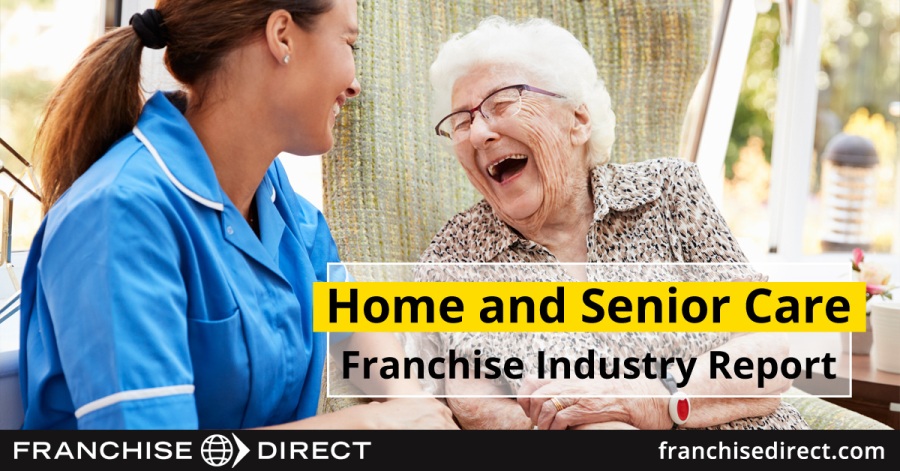
The more research we did and the more we learned about the positive impact the business would allow us to make on individuals and families in our community, the more we realized this was something we wanted to do. We are looking forward to growing our Caring Transitions business and to having an opportunity to become a bigger part of this community.
5 Quick Facts About the Home and Senior Care Industry
- The U.S. is expected to need 2.3 million new healthcare workers to care for the aging population by 2025.
- At least 10,000 baby boomers (those born between 1946 and 1964) will turn 65 every day until 2029.
- The older population is on track to outnumber children by 2035, according to the Census Bureau.
- Per AARP, about 76% of Americans over 50 say they want to grow old in their own homes.
- However, it’s been estimated that between 30% and 37% of those who use home care services in a year aren’t of senior age.
The Home and Senior Care Franchise Industry
Franchises of the home and senior care industry provide both medical and non-medical assistance for families and individuals in need. The vast array of services provided include:
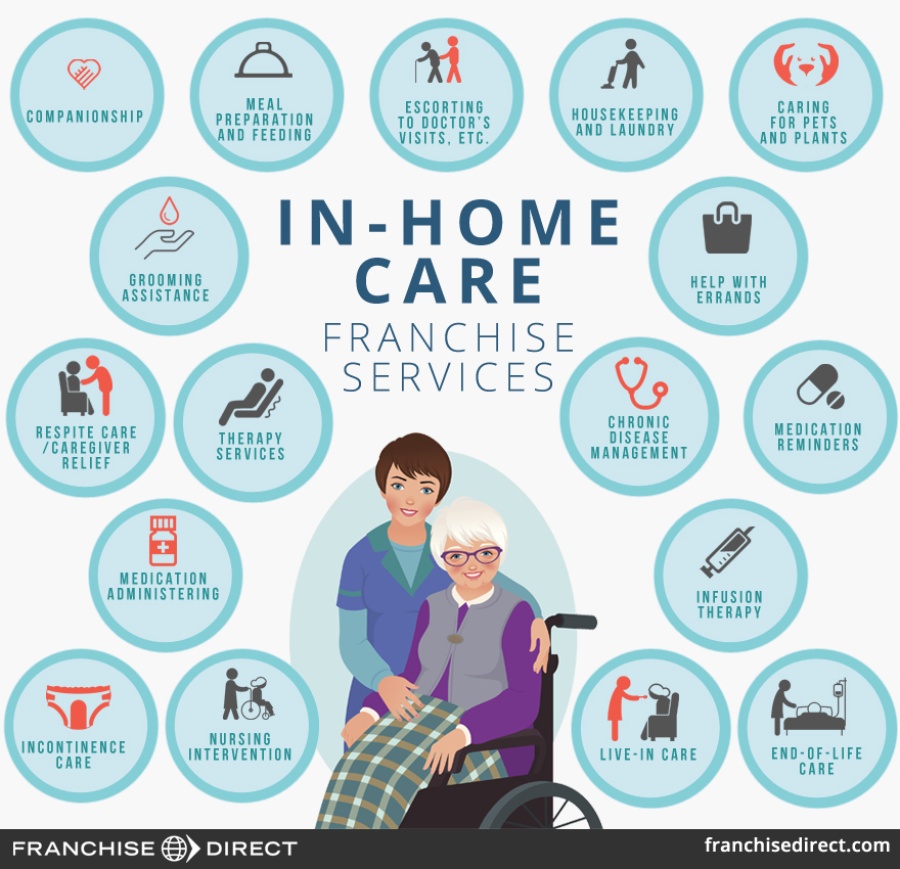
Home care assistance can largely be divided into three categories:
- Companion care: often involves visits to elderly adults to ward off loneliness and maintain a level of socialization.
- Personal care: includes assistance with stimulating activities, meal preparation, ambulation and transportation, feeding and toileting, and assistance with issues related to memory loss.
- Skilled nursing care: includes many services typically conducted in a hospital or health care facility.
Over the past 10 years, the industry has exploded in popularity. The biggest reason for the exponential rise in home care is simple: People want to convalesce or get older where they feel the most comfortable.
“More and more people are finding that they want to stay home,” said Beth Trivett, a caregiver employed with ComForCare in Hendersonville, Tennessee. “They battle going to a nursing home or rehab, but for a lot of families, it is hard to take on another family member when you have so much to do. I can go to bed at night grateful that I was able to keep someone at home at least for another day.”
But caregiving isn’t the only way to own a home and/or senior care franchise.
While it is the most prevalent mode of franchising in the industry, being a caregiver isn’t the only way to be a part of the industry.
“Senior-focused businesses are booming for the simple reason that with the increase in aging population, people need solutions to problems that they have never faced before,” says Christopher Seman, president of Caring Transitions. “Whether [it’s] rightsizing, aging in place, or cleaning out an estate, the need for services has never been higher and is continuing to grow.”
Other examples of non-caregiver senior care franchises include Assisted Living Locators, CarePatrol, and Senior Care Authority, which help guide seniors and their families through the process to make the best choice for them when the need arises for the move to a live-in facility.
In addition, many healthcare and senior care franchises can be run by CEO model, meaning you run the company administratively while your employees go out into the field to service clients.
So if you want to help, but aren’t sure about the day-to-day workload, that’s fine. There’s likely a franchise for your desired level of involvement.
Home Care is More Than Senior Care
While seniors do make up a large percentage of the home care market, they aren’t the only ones served by home care franchises. The most recent statistics from the CDC calculate that 30% of the people using home health care are under the age of 65.
Non-senior home care covers adults aged 18-64, assisting with a number of non-medical and support services. Care is provided to people with chronic conditions such as ALS or paraplegia, as well as to those with learning or physical disabilities. More temporary help is provided to those who are recovering from surgery, illness, or injury. Home care providers have also been known to assist mothers pre- and post-natal too.
Common non-senior home care services include the following:

But senior care is still the main focus. And the numbers illustrate why.
According to the U.S. Census Bureau’s Current Population Survey (CPS) Annual Social and Economic Supplement (ASEC): “The number of Americans ages 65 and older is projected to nearly double from 52 million in 2018 to 95 million by 2060, and the 65-and-older age group’s share of the total population will rise from 16 percent to 23 percent.”
Note: Home and Senior Care Can Cross into Other Franchise Industries
Because of the increase in seniors seeking to “age in place,” senior care has crossed into other franchise industries such as home improvement.
For instance, TruBlue Total House Care has long been a home services franchise that offers specialized service packages to seniors. The franchise even recently partnered with home care franchise Right at Home on a “Preferred Provider Agreement.”
“Our goal is to help seniors age worry-free in their own homes and provide peace of mind to their families,” TruBlue President Sean Fitzgerald says. “Right at Home has done a terrific job caring for seniors and adults with disabilities. By partnering with Right at Home, we can ensure our clients find in-home care as their needs change. We can also help Right at Home’s clients with needed home modifications and ongoing repairs and maintenance to ensure the home environment remains safe.”
In fact, the growth of aging-in-place has become so significant that the National Association of Home Builders has partnered with AARP to develop the Certified Aging-in-Place Specialists program (CAPS) to “meet the increasing demand by seniors and baby boomers for barrier-free living environments.”
Thing to Watch: COVID-19’s Impact on the Adoption of Home Care
COVID has accelerated the adoption of homecare. In many cases, families made the decision to move loved ones into facility care because it was easier, it eliminated the direct management of care, and alleviated a lot of stress, especially in remote family settings or with family caregivers. That move was often cost neutral as care needs increased. Since many families were prohibited from visiting their loved ones during the height of the pandemic, and in many cases losing a loved one to death, the PTSD around the risks associated with facility care has driven many to bring care back to the home.”
Before the pandemic, families were—at an increasing rate—moving their older loved ones into facilities for care. But now, after experiencing lockdowns that kept them apart, families “are now bringing them home where the environment is safer” according to Mike Magid, who is the chief operating officer at Griswold Home Care, the first non-medical home care franchise.
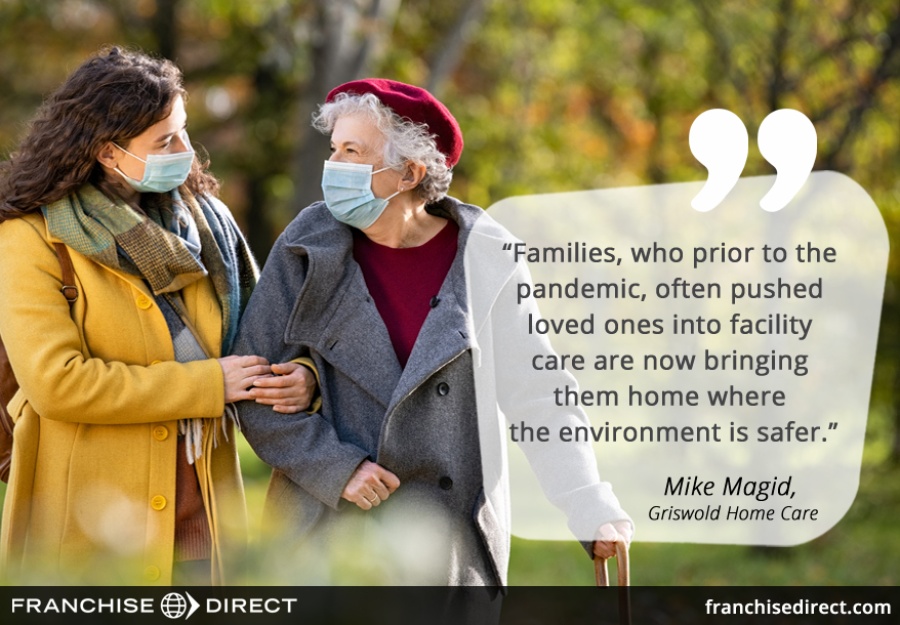
But it wasn’t just the public’s attitude towards home health care that shifted. This is how the business side of the industry has changes in just one year since the pandemic hit, he says:
- Technology is playing a bigger role than ever before.
- Much of what was done in person with various constituents in the homecare industry is now being done virtually, i.e. client assessments, caregiver recruitment, referral source relationship building, office functions, etc.
- COVID has accelerated the breakdown of barriers between skilled and non-skilled.
- Unbudgeted costs for PPE equipment, sick leave, hazard pay, etc. have impacted profitability.
2020 exposed a lot in the way of healthcare—and ways it could be made better. The possibilities have a group of heavy hitters in the industry ready to band together in hopes of advancing the cause.
According to Cale Bradford, chief government relations officer at Elara Caring, an alliance such as the Moving Health Home coalition would have formed regardless of the current health landscape. But, as Magid noted and as was explored in a Home Health Care News article, COVID-19 has accelerated the need for more home-based care advocacy.
The recently-unveiled coalition, which includes senior care franchises Home Instead and BrightStar Care, also includes: Amazon Care, Landmark Health, Signify Health, DispatchHealth, Elara Caring, Intermountain Healthcare, and Ascension.
Said Shelly Sun, the CEO and founder of BrightStar Care, “The future of healthcare is in the home, and BrightStar Care is honored to be a part of a coalition that is set to change how our country approaches access to clinical care.”
The goal of the coalition? Increase awareness around the range of medical conditions that could be treated in the comfort of one’s home, and also advocate for better reimbursement models.
“Our ultimate goal is improving patient quality and improving the number of healthy days all Americans have in their communities,” says Chris Johnson, head of corporate development at Landmark. “And finally and importantly, really reducing the overall cost of care.” Added Sun, “The pandemic showed us how important it is to keep the most vulnerable safe at home, and we are proud to be joining Moving Health Home’s mission to explore opportunities to further advance a national conversation around increasing access to home-based care services.”
According to HHCN, the aligned parties “will immediately begin to advocate for regulatory and reimbursement policies that take advantage of the home environment as a broad care delivery venue.”
Though, per Magid, this shift may already be occurring. “COVID, to the detriment of facility care, has positively impacted the home-based care industry. It will also accelerate Medicare Advantage plan benefits. COVID has helped galvanize the healthcare/homecare continuum of care to work together more quickly than what would have happened on its own.”
If you think about the future of the hospital, it looks a lot like your living room. I think home caregiving is definitely a growth opportunity for a future workforce. The home is really the only scalable place where we can care for people.
Making Senior Care Not Feel Like Senior Care
Yes, as some people get older they will need more assistance than they would prefer. But that doesn’t mean they want to be babied. Some care facilities can feel restrictive to their patrons. Senior Helpers is just one of the franchises looking to change that perception.
<blockquote>“I look at the adult day care industry and think that it is kind of like the home care market was 20 years ago,” says Senior Helpers CEO Peter Ross. “There is a tremendous opportunity there.”</blockquote>
Ross has a point. According to AgingInPlace.org, “There are at least 5,685 adult day care programs operating in the United States, up from 4,601 in 2010. These centers have increased in the number of people who they serve by over 63% since 2002.”
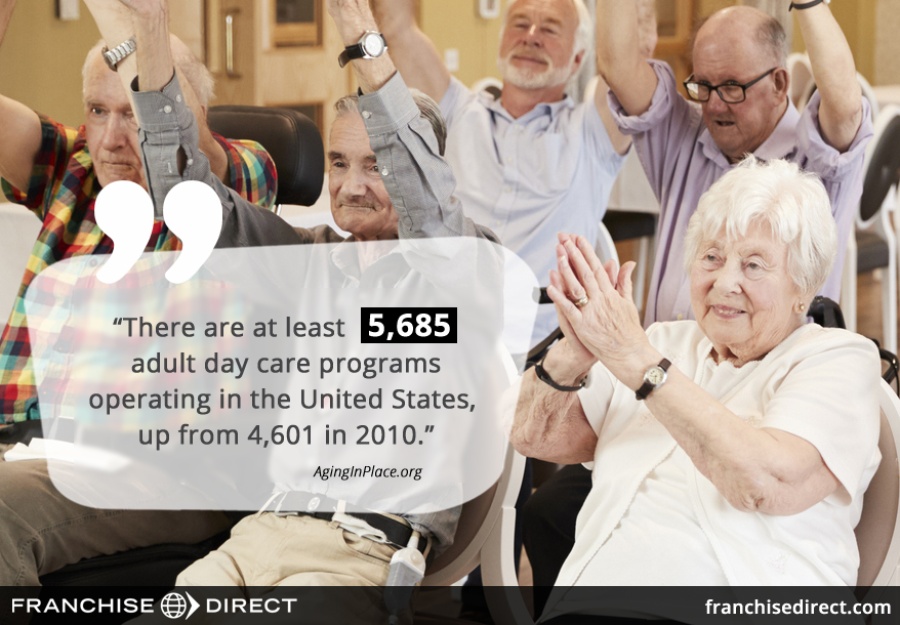
Sensing the opportunity about five years ago, Senior Helpers launched a franchise offering that uses seniors’ memories of “Main Street” to its advantage. The company’s Town Square adult day care concept resembles a classic, small town from the 1950s, including “12 individual storefronts that offer interactive programming for members in an immersive, nostalgic environment.” The storefronts consist of a diner, a movie theater, a hair salon, a library, city hall, and more.
But the Town Squares do more than provide a place for nostalgia.
The centers were developed in partnership with the George G. Glenner Alzheimer’s Family Center, and—as noted in Home Health Care News—are based on dementia villages pioneered in the Netherlands.
“Giving seniors purpose through reminiscence therapy has been a great add-on,” Ross says of the concept. The activities designed for reminiscence and engagement include prompts from the past, which “can help to improve mood and sleep quality, and has even been shown to reduce agitation among those with Alzheimer’s and other forms of dementia.”
In addition to the nostalgic feeling they can produce for elders, adult day cares, like the Town Squares, also help more people afford a safe way for people to care for their aging loved ones.
“People who can’t afford home care can come into Town Square and have an experience like nothing else,” Ross says.
The numbers back him up. Per AgingInPlace.org, “The national average rate for adult day centers is $61 per day (for an average of 8-10 hours of care) compared to an average rate for home health aides of $19 an hour. Per day median cost in the U.S. for adult day services is $69 as opposed to $126 for home care, $120 for assisted living, and $235 for nursing home care.”
For prospective franchisees interested in the Town Square concept, no medical background is required. “At Town Square, we are seeking franchisees who are business-minded individuals with outstanding management, sales and customer service skills, and who have a heart for helping others.”
Opening a Healthcare or Senior Care Franchise
Prior to investing, prospective franchisees should do their research as well as carefully review the franchisor’s Franchise Disclosure Document (FDD) for more detailed information on all systems, procedures and costs associated with that franchise.
It’s important to note that while many initial and ongoing costs are detailed in the FDD, there are some costs inherent to business ownership, like employee wages or utility costs, that aren’t.
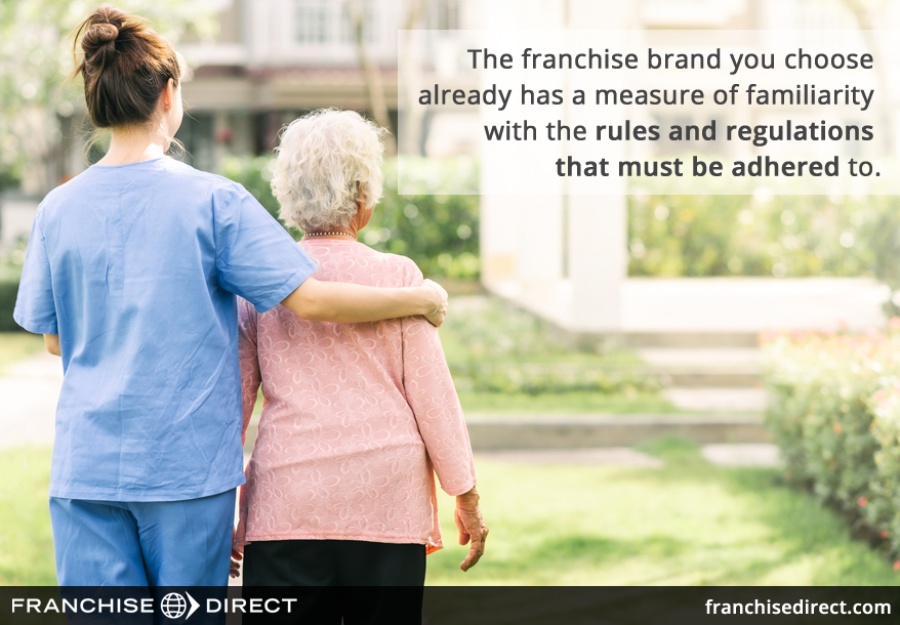
Special Industry Consideration: Insurance and Licensing
For “extreme exposure” franchise industries, such as elder care, the insurance policies needed are typically very similar to the policies needed for all industries. However, “the limits can vary drastically and so can coverage or even exclusions for an extreme exposure,” says Doug Groves, founder of Program Insurance Group, a company that offers insurance products and services tailored for franchises.
“Depending on the exposure, a much higher umbrella limit might be required, or errors & omissions insurance could be crucial for the work or service offered,” he says. “It depends on where the risk is highest; ask yourself “What am I most likely to be sued for?” and ensure your limits and coverage are more than adequate. This is where a knowledgeable agent will advocate for you by helping you understand your special risk and the wording of your particular circumstances and needs.”
One of the advantages to aligning yourself with a franchise in the home and senior care industry is, in many cases, the franchise brand you choose already has a measure of familiarity with the rules and regulations that must be adhered to. Within the FDD for franchises, there will be an estimate for how much it will be to obtain your initial insurance and licensing.
--
Start your healthcare or senior care franchise search today by searching our listing of some of the top healthcare and senior care franchises. You also find advanced investment information for a number of healthcare and senior care franchises in our FDD Research Hub.
Hottest Senior Care and Healthcare Franchises
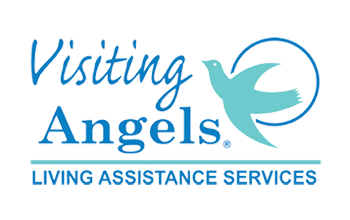
Visiting Angels Living Assistance Services
Join "America's Choice In Homecare®", ranked #1 of all senior care franchises.
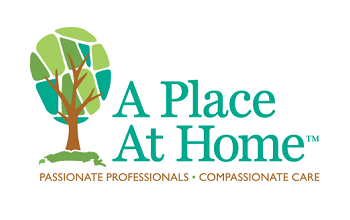
A Place at Home
Our proven growth and full continuum of care services makes us truly unique in the senior care industry!















